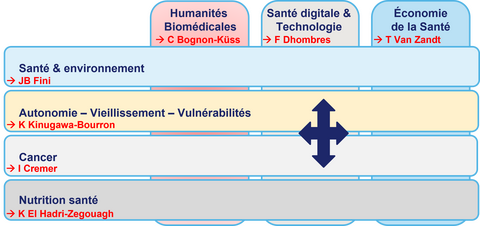
About the ASU-GHI
At the heart of the Sorbonne University Alliance, hundreds of professors, researchers, engineers and health professionals are working together to rethink global health.
The ASU-GHI
The concept of health has been constantly evolving for several decades, going beyond the strict scope of the human organism to include its biotic and abiotic environment. Health must be considered in its “global” dimension, integrating not only the physical aspects of health but also the social, economic and environmental factors that influence the well-being of individuals and communities across borders. It is in response to these challenges, and because Sorbonne University (SU) and its partners in the SU Alliance (ASU) have the scientific foundation necessary for this interdisciplinary and cross-cutting approach to health, that a Global Health Institute was created on January 1st, 2025. The Sorbonne University Alliance Global Health Institute (ASU-GHI) aims to improve access to care, prevention and health equity through a systemic and participatory approach that integrates the study of the biological, environmental and psychosocial determinants of health. The Institute’s four priority research areas are: 1/ Health and Environment, 2/ Autonomy, Ageing, Vulnerability, 3/ Cancer, 4/ Nutrition, all viewed through the prism of biomedical humanities, health economics, and innovation in digital health and technology.

In addition to new interdisciplinary and cross-disciplinary collaborations aimed at producing scientific advances that would otherwise be unattainable, the Institute also aims to establish a culture of global health. To this end, the Institute supports the development of innovative training programmes throughout the curriculum, including continuing education, starting with the creation of a Master’s degree in global health.
Interdisciplinary in nature, the ASU-GHI creates synergies between research teams and innovative training programmes, while promoting exchanges with institutional, industrial and academic partners, both in France and internationally. This collaborative dynamic generates new knowledge, promotes scientific excellence and supports the transformation of healthcare practices.
A dual heritage for global health: biomedical humanities and health economics
The Sorbonne University Alliance Global Health Institute (ASU-GHI) is part of a series of major interdisciplinary initiatives developed since 2020, demonstrating Sorbonne University’s commitment to a systemic and comprehensive approach to health.
One of the founding pillars of the Institute is the Biomedical Humanities Initiative, led by Cécilia Bognon-Küss, Claire Crignon and Alexandre Escargueil. Accredited by Sorbonne University, this programme has brought together a diverse scientific community at the interface of the humanities, social sciences and biomedical sciences, focusing on ethical, epistemological and cultural issues related to health. This work has helped lay the foundations for an integrative vision of health, attentive to its historical, philosophical, social and cultural dimensions. Fully embracing this heritage, the ASU-GHI has made biomedical humanities one of its three vertical pillars, thereby strengthening the link between research, education, expertise and dialogue with society.
Another fundamental pillar of the Institute is the Alliance Sorbonne University Health Economics Initiative, coordinated successively by Alexandra Roulet and Timothy Van Zandt. While health economics is often reduced to the cost-benefit analysis of treatments, this initiative offers a broader approach. It encompasses public health, health system policy and management, insurance, medical innovation, and more generally any issue where human behaviour has an impact on health. The integration of this focus into the Institute reflects a desire to explore economic levers for equity, prevention and access to care. This perspective is essential for shedding light on many cross-cutting issues: from pollution regulation to the impact of retirement policies on ageing, including the links between family structure, financial situation and long-term care, and the interactions between innovation, nutrition and social inequalities.
By bringing these two initiatives together within a sustainable structure with a national and international focus, the ASU-GHI capitalises on their scientific and educational achievements. It affirms a shared vision: thinking together about the health of tomorrow, taking into account the complexity of the contexts, values and practices that shape it.
